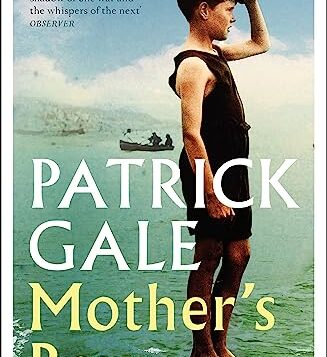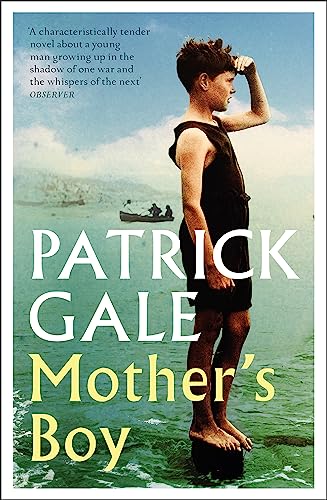MOTHER’S BOY is the seventeenth book by Patrick Gale, but you may not have heard of him. Although he’s a bestselling author in Great Britain, he has been without an American publisher since his first three books came out. The novels are so quiet that you can miss how skillfully written they are. Mother’s Boy is both hushed and breathtakingly powerful, a biographical novel in the tradition of novels like Colm Tóibín’s The Master and The Magician that follow the known facts of a subject’s life and imaginatively fill in the gaps.
In this case, the subject is the poet Charles Causley, a name that may not resonate very strongly in the U.S. but who’s a beloved figure in Britain for his war poetry and his children’s verse. Causley grew up in Launceston, a small Cornish town. There he stayed all his life, teaching in the local school and living with his mother until her death. The longest he stayed away was during World War II, when he may have had the only sexual relations in his life, and they were with other men. Gale wants to understand how Causley became so fixed in his life, geographically and sexually: in short, how he became a “mother’s boy.”
Meanwhile, we learn a great deal about his mother’s sacrifices while nursing an ailing husband who was devastated by serving in the Great War, and, after his death, while supporting a child on what she can make as a washerwoman. “Laundress” seems too fancy a term for her labors. She is almost always in hot water, scrubbing the sheets of the local bawdy house with their distinctive stains or the less sordid clothes of the local gentry. The book provides handy tips for erasing a number of discolorations. But poor as she is, Mrs. Causley does the church clothes for free and attends services regularly. She is a saint, heroic in her efforts to care for her son. When one of the ladies offers to give Charles piano lessons, she makes the colossal investment of purchasing an upright, which barely fits into their parlor. The piano is equal to a month’s earnings. But her thrift as well as her generosity are local legends. And her efforts are not wasted. Her son is a genius—there she’s right. He becomes the pianist for not one, but two local dance bands.
There is a limit to her bounty, however. The most painful one has to do with Charles’ education. He’s an extraordinary student, and everyone, including his teachers and friends, think he’s destined to go to the university. But Mama is growing weary and would like the extra pay that her son could bring in. And so, despite her misgivings, she takes him out of school. She finds him suitable work—a desk job—in a local business. When the business goes under, she finds another job for him. How many mothers procure jobs for their sons? But no one can refuse the sainted Mrs. Causley in her efforts to watch over her devoted, if peculiar, child. What Gale quietly suggests is that university would mean separating the two, not just physically, but also in terms of class—Charles would be taking a step away from her socially.
The archness of my summary distorts Patrick Gale’s control of the narrative. He is never ironic or critical of the mother. He allows her to win our sympathy. She loves her son. Mrs. Einstein probably had a similar problem—how do you raise a genius? You know he’s not like the other boys, but you also know that the difference is a double-edged sword. Worse, he has needs and desires that you can’t begin to understand. How can you protect your child from forces beyond your comprehension? You keep him close in the world you know.
Then World War II arrives, and Charles is in sufficiently good health to be drafted. He will not join the Army—because of what it did to his father—so he joins the Navy. Luckily, Mama doesn’t have to worry about an empty nest. The blitz creates a seemingly endless stream of women and children who need safe places in the country. At first she takes in women, but as each of them shows or seems to show an attachment to Charles when he’s home on leave, she finds to her dismay their shortcomings, and off they go. In the end, Mrs. Cawley makes a home for two young brothers—no worries there—and shows them the motherly devotion she gave to her own son.
It is in the Navy that Charles acts on his sexual desires, at least according to Gale, based on his study of the letters. The problem occurs when Charles tries to integrate these naval love affairs into civilian life. One of his lovers marries after the war and wants nothing to do with Charles. The second is far more complicated. Charles believes that he died when his ship was sunk. When the man shows up on his mother’s doorstep, Charles has to deal with the fact that his beloved not only is alive but also wants to pick up the relationship where it ended. Charles, as we have learned often in the novel, does not deal well with surprises.
It is in this nearly final scene of the novel, the point where Charles must choose between his mother and the man he loves, that Patrick Gale imagines the most breathtaking narrative solution—breathtaking in its simplicity and its rightness. A spoiler alert is in order here. Charles pleads with his mother to stay in the room while he adjusts to the twin surprises of his lover’s survival and arrival in the house. (Causley’s poems are filled with ghosts’ unwanted appearances.) But mother won’t stay. She has a wonderful excuse for leaving: you boys have so much to catch up on; I’ll just be in the way. It’s the polite thing to do. But she correctly guesses that without her presence, their conversation—which is left to the imagination, because it goes on behind closed doors—will move to an emotional intimacy that Charles will reject if it’s sprung upon him. And so the lover who has tracked down Charles in his remote town in Cornwall is allowed to leave without dinner. It is a harsh statement about both Causley and his mother, and their enabling and disabling relationship, a harsh but unspoken judgment left for the reader.
For in this quiet novel—and Gale’s fiction grows quieter and quieter, so even a bomb blast is muffled—Gale refuses to judge his characters. I sense that this is from a genuine generosity of spirit, a desire to allow the characters time to develop on their own. Quietly we learn that to become a mother’s boy requires the cooperation of both the mother and the boy, and it may lead, as in the case of Charles Causley, to some of the finest poems of his generation.
David Bergman is a professor of English at Towson University, MD, and poetry editor for this magazine.







